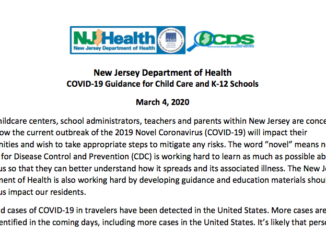
ENGLEWOOD, N.J.—Behind the lure of glitzy casinos, sports betting bars and even online video games, lurks the danger of gambling addiction, a serious problem that affects millions of people of all ages throughout the U.S.
Over 80 percent of American adults gamble on a yearly basis, with 118 million wagering on sports. As many as 750,000 young people ages 14 to 21 have a gambling addiction.
In 2014, the Substance Abuse and Mental Health Services Administration reported that 7 to 10 million people in the United States have co-occurring mental and alcohol or drug use disorders, such as depression disorders, anxiety disorders, substance abuse disorders and anti-social personality disorder. What’s worse, a gambling addiction can get worse when left untreated.
The problem gambling rate in New Jersey is approximately 6.3 percent, three times the national average, according to research done in 2017 by Rutgers University, and New Jersey is the state with the most forms of gambling.
To address this situation, on April 9, the Englewood Department of Health, Englewood Health and the Englewood Municipal Alliance/Stigma Free Task Force gave a presentation by the Council of Compulsive Gambling of New Jersey with the compelling theme, “Gambling with Your future: It’s Risky.”
The program, held in the Chiang Auditorium of Englewood Health, featured Frank Lazzaro, a problem gambling prevention specialist, and Dan Trolaro, assistant executive director of the Council on Compulsive Gambling of New Jersey. Special appearances were made by Englewood Mayor Michael Wildes and Miss Bergen County, Annelise Malgieri, who has made mental health advocacy and fighting stigma a focus on her pageant platform.
Prior to the presentation, Englewood Health staff, mental health experts and representatives from supporting organizations answered questions and gave out information and logoed novelty items. There were also several exhibits set up throughout the lobby outside the auditorium with refreshments, and a string trio performed, led by Daryl Goldberg of the Leonia Chamber Musicians Society.
At 7 p.m., the Chiang Auditorium at Englewood Health began filling with residents and distinguished guests such as Councilmen Charles Cobb and Wayne Hamer.
David Drapkin, LCSW, Englewood Health Behavioral Health program manager and addiction specialist, welcomed everyone and made the introductions. He stated an important theme of the evening: “Health doesn’t stop at the neck!”
Deborah Baldwin, director of the Englewood Municipal Alliance/Stigma Free Englewood, thanked the participating sponsors and speakers and related the key theme of the evening.
“Even as much of our work now addresses current health concerns and how to help the community in need, it is important to remember the definition of public health includes ‘preventing disease,’” Baldwin said.
Next, Mayor Wildes gave an inspiring speech.
“I’m so encouraged to see all of the great work being done to educate the community and help individuals facing a variety of challenges to cope and feel welcome here in Englewood,” Wildes said. “Most of the issues we are facing are not new, but have often been demonized and neglected as dark secrets we should be ashamed of or would rather not address. The fact that we are actually talking about issues such as mental health is the first step towards acceptance and healing, and efforts such as the Stigma Free program are leading the way in this fight.
Malgieri, who is on track to compete for Miss New Jersey and Miss America titles, has made mental health advocacy a priority of her pageant platform. Malgieri, an occupational therapy student at Columbia University, is in recovery from obsessive compulsive disorder and generalized anxiety disorder. She recited a heartbreaking poem about her personal struggle with mental illness that she is using for the talent portion of the upcoming competitions.
Lazzaro, who previously suffered from gambling addiction, began the presentation by saying, “At the Council of Compulsive Gambling of New Jersey, we are not for or against gambling. We address ‘disordered gambling,’ and as such, we receive some 77,000 calls a year and direct people to counseling and support services.”
Lazzaro went on to explain what “problem gambling” and “disordered gambling” are and how and why it manifests itself in males and females, adults, adolescents and seniors.
Throughout his presentation, Lazzaro made many important points, such as the council’s guidelines for responsible gambling, which include: decide ahead of time how much money you are willing to gamble with and stick to your limits; know that it is likely that you will lose more often than win; think of gambling as a form of entertainment—not a way to make money; don’t gamble when you are tired, bored, anxious or angry; and keep track of how much time and money you spend and never borrow to place bets.
Trolaro followed, saying gambling was recognized as the only non-substance related disorder in 2013 by the DSM 5, which is the Diagnostic and Statistical Manual for Addiction Disorders published by the American Psychiatric Association.
He enumerated the five “E’s” of gambling: excitement, entertainment, escape from life’s problems, economics (the promise of making money), and ego.
He also examined how gambling and gaming converges both in mechanics and psychology. This impacts youth and adolescents at an earlier age when gambling-like activities are introduced into video games through the use of “Loot Boxes” and the normalization of spending money on items of chance.
Trolaro discussed in length how children develop gambling problems, often by behavior patterns set by their parents or through social media, as well as the damage that gambling does to their developing brains.
Trolaro devoted an eye-opening segment of his talk to e-sports, online competitive gambling in real time, with themes that appeal to any demographic. It has become a global industry.
The administration of former Gov. Chris Christie litigated a Supreme Court case to allow for legalized sports betting in New Jersey, eventually prevailing after Christie’s term had ended in 2018. Gambling has long been legal in Atlantic City. The state also sanctions ongoing lottery games.
A key takeaway from the presentation were that language is important and that the stigma must be removed from gambling addiction. In other words, a person can be called “someone with a gambling addiction” or “someone with a gambling problem,” but they should not be labeled a “gambling addict.”
Another important takeaway was the help and resources that are available in and around the state, such as Gamblers Anonymous and Gam-Anon. There are 37 help centers in New Jersey.
The Agency Partners for “Gambling with Your Future” included the State of NJ Governor’s Council on Alcohol and Drug Abuse, City of Englewood, the Mayor and Council of Englewood and Englewood Department of Health. There were also acknowledgements from The Defining Moment Foundation and the Englewood Public School District.
Photos by Hillary Viders



